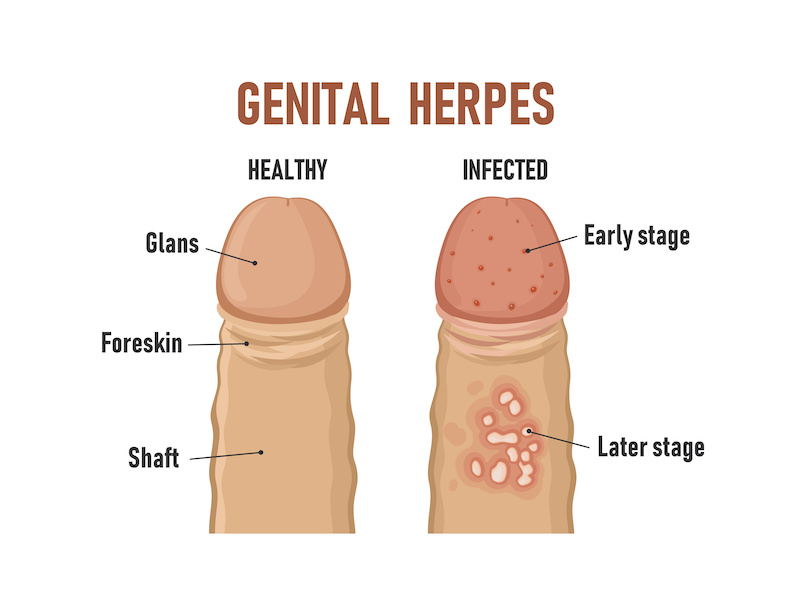Genital herpes results from getting infected by the herpes simplex virus. The virus is primarily spread through sexual activity. This includes oral sex, anal sex, and any other forms of direct sexual contact. There’s unfortunately no cure for the virus, but with the right insight, you can prevent yourself from getting it or spreading it. Here’s what you need to know about genital herpes:
1. Symptoms
Most men don’t experience symptoms from genital herpes. Sadly, you may spread it without even knowing. Bear in mind that it’s mostly common in females than in males. This is because the virus causing the infection is more easily passed on to females than males.
However, sometimes you experience symptoms, but they often start out very mild. It’s easy to mistake them for small pimples or ingrown hair. Herpes sores look like white blisters or small red bumps, and they pop up in any area of your genitals.
A blister may rapture, causing a painful ulcer to form in its place. As a result, urinating might become painful. When the ulcer heals, it’s followed by a scab in the same area. Avoid picking at the scab for it will just result in more irritation and pain.
You may also experience other genital herpes symptoms. These include muscle aches; fever; tiredness; swelling in the groin, neck, or underarms; and a tingling sensation in the genital area. You may find bumps and rashes on your testicles. Hence, it’s best to check out this link to find more information.
Sometimes, the symptoms you get might not be of genital herpes. At any rate, it’s always worth getting checked.
2. How Long It Takes For Symptoms To Appear
After exposure to genital herpes, symptoms may take anything from two days to two weeks to appear. When symptoms appear, they’re referred to as an outbreak. When you get treatment, you may experience more outbreaks during the following year and occasionally throughout your lifetime.

3. Testing And Diagnosis
It’s wise to get checked by a healthcare practitioner if you suspect you may have been exposed to genital herpes or spot any symptoms. Knowing where you stand may help reduce fear-induced stress. Sometimes, healthcare practitioners are able to give you a diagnosis from merely looking at you. Other times, they extract a fluid sample from a blister for testing.
Practitioners may also ask you to do a blood test. If you’re asked anything concerning your sexual history, be honest. You may need further testing for any other STIs, so your honest answers help to determine that. Remember they’re bound by a non-disclosure agreement and can’t discuss your issues with anyone.
4. Treatment
There’s sadly no cure for herpes. However, you can suppress the virus with antiviral medication. Antiviral medication helps minimize outbreaks as well as prevents genital herpes from reproducing. Ultimately, this reduces your chances of passing the virus to others.
You may need daily medication if your outbreaks are persistent. However, if you’re lucky, taking medicine at the first sign of an outbreak may be enough. Antiviral medicines usually prescribed include famciclovir, valacyclovir, and acyclovir.
Try as much as possible to keep your genital area dry and clean during an outbreak. Applying a covered icepack a few times daily may also help reduce itching and pain. Avoid transferring the virus to other parts of your body by washing your hands whenever you touch the affected area.
Try to reduce your chances of contracting genital herpes by practicing safe sex. This includes using condoms, sticking to one partner, and avoiding sexual activities when your partner has symptoms. There are no vaccines to prevent the spread of genital herpes yet safe sex may be your best bet.
5. Triggers Of Outbreak Recurrence
Although it’s not always the case, sometimes you’re able to tell when you’re going to have a genital herpes outbreak. Itching, tingling, and pain are some of the signs of an impending outbreak. You may start to see blisters a day or two after experiencing these signs.
You may find that illness, fatigue, stress, poor diet, and friction in the genital area may also lead to more outbreaks. It’s helpful to figure out your triggers to work around them. This will help minimize the number of outbreaks you may experience in a year. Outbreak recurrence may also start to reduce as the years go by.
6. Possible Complications
The HSV-2 infection causing genital herpes has been found to work hand in hand with HIV. You increase your chances of getting HIV by approximately three-fold if infected with HSV-2. You’re also more likely to spread the virus if you have HIV.
Genital herpes can have more severe symptoms and frequent outbursts if you suffer from HIV. In cases wherein HIV has advanced, HSV-2 may cause more severe but rare complications. These include esophagitis, hepatitis, pneumonitis, meningoencephalitis, and retinal necrosis.
Conclusion
Genital herpes is primarily transferred through unprotected sexual encounters. It has no cure yet, neither can you vaccinate against it. Your best bet is prevention, but in the event that you contract it, it can be suppressed with the help of antiviral medications. Early diagnoses and treatment may reduce outburst recurrence.

